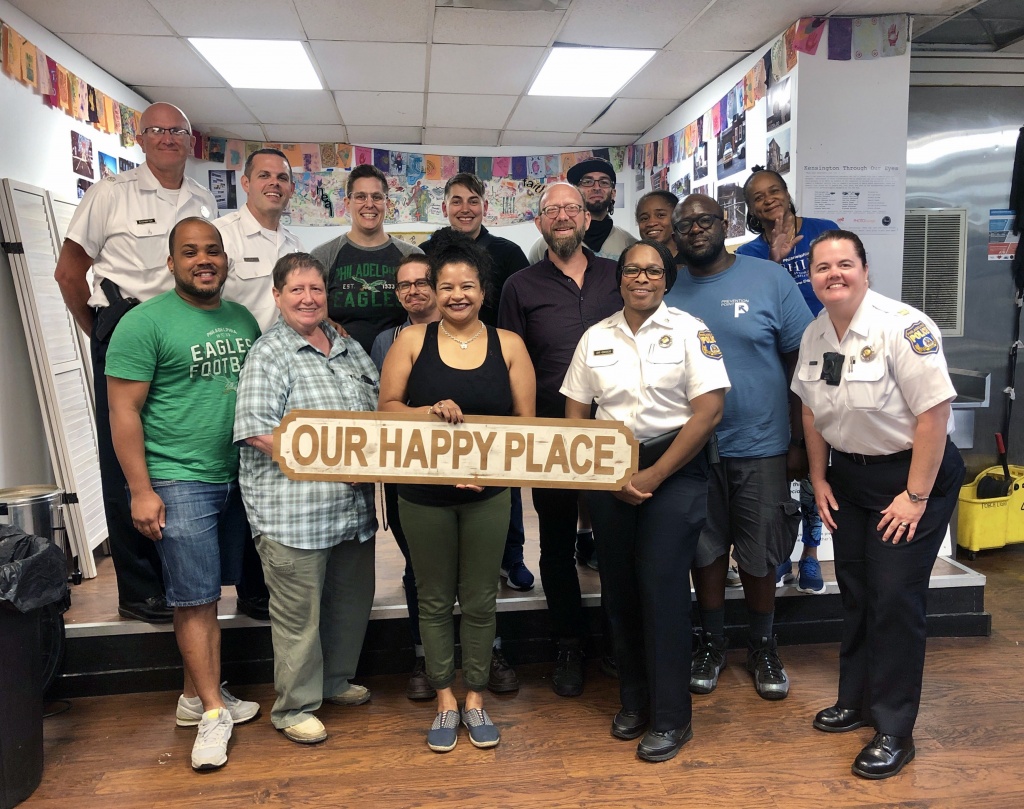In 2020, every police officer in Philadelphia will receive LGBTQ competency training, Sergeant Nicholas Tees announced last week at a Philadelphia Police LGBT Liaison Committee meeting.
While recruits and detention unit staff are already trained, the renewed effort will focus on educating in-service officers, including those who have been on the force for years, Tees said. The knowledge is important for both LGBTQ officers and those not yet out, as well as the city’s LGBTQ community, he added.
“One of the things we recognize is that officers who have more time on, they may not have had the training the recruits have,” Tees told PGN. “So no matter what, if you just came out of the academy, or you have 25, 30 years on the job, you’re going to go through that training.”
Gathered under the El subway line on Aug. 8 at the Kensington Storefront, a public art-making space that organizes programs for those experiencing homeless, addiction or trauma addiction, the Philadephia Police LGBT Liaison Committee convened for the group’s monthly meeting. Members include representatives from Philly social service organizations like Prevention Point, the Department of Behavioral Health and disAbility Services and Philly Pride Presents.
Deputy Commissioner Joseph Sullivan serves as the police department’s LGBTQ liaison, supported by Inspector Altovise Love-Craighead and Tees, an out gay man. The department will meet with New York City officers to learn about LGBTQ competency training and use the information to help inform Philadelphia’s methods, Tees said.
The Philadelphia Police LGBT Liaison Committee, co-chaired by local activists BJ Jones and Deja Lynn Alverez, advises police on issues impacting Philadelphia’s LGBTQ community and provides support to queer people who want to bring crimes to police attention but may feel afraid to do so. The group played a role in developing the police policy directive governing officers’ interactions with trans and nonbinary individuals that was released this summer.
About 15 percent of LGBTQ people have avoided calling the police because of fear of discrimination, according to a November 2017 report conducted by National Public Radio, the Robert Wood Johnson Foundation and Harvard T.H. Chan School of Public Health. The likelihood of this more than doubles for LGBTQ people of color. More than one-quarter of queer people say they or an LGBTQ friend or family member has been unfairly stopped or treated by the police, the report continues.
The LGBT Liaison Committee, which is in the process of developing a charter to govern the group’s proceedings, also printed resource cards listing emergency numbers for LGBTQ people in need of various services. Local organizations listed include the Philadelphia WOAR hotline, Mazzoni Center, the Attic LGBT Youth Center and the LGBTQ victim advocate at Center City Crimes Victim Services.
The emergency numbers have been added to the police dispatch system, Tees said, in an effort to encourage police to connect members of the community calling for help with applicable resources.
At the meeting, committee members also discussed the impact of the recent Philadelphia Trans Wellness Conference and the ongoing functions of Operation Save Our City, an organization devoted to ending local gun violence.
The next LGBT Liaison Committee meeting takes place Sept. 12.
